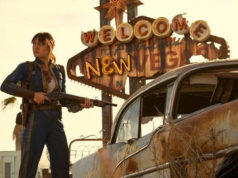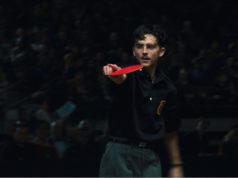That may still be the case, but now I have to add that The King of Kong: A Fistful of Quarters is definitely the most entertaining one. Seth Gordon’s video-gaming doc has all the riveting drama of a great sports film, and given how many out-of-shape guys appear in it, that’s quite an achievement. The movie begins with Billy Mitchell, who as a teen in the early 1980s was the high-scoring champion on several of that era’s popular video games, including Donkey Kong. No other gamer even approached his 987,000-point high in the following decades. In 2005, he’s a barbecue-sauce manufacturer in Hollywood, Fla., who basks in his reputation as a gaming legend. Then an unknown named Steve Wiebe, a science teacher and father of two from Redmond, Wash., scores a million points on the Donkey Kong machine in his garage.
Having recorded the game on his video camera, he sends the tape to Twin Galaxies, a video- gaming web site that keeps track of all-time high scores, and challenges Mitchell’s record. That’s when the fun starts. Mitchell talks the talk but acts like a total douche when his record is threatened. Insisting that a videotaped performance can’t be taken as legit, he dares Wiebe to duplicate the feat in public on a neutral machine. When Wiebe comes through, Mitchell dodges any head-to-head competition with him and sends in a videotaped performance of his own million-point game to serve as the new record. The champ’s hypocritical tactics go unchallenged because most of Twin Galaxies’ guys are his friends, and the Guinness Book of World Records throws gasoline on the controversy by agreeing to use Twin Galaxies’ numbers as their own.
Gordon should have included more on why the organization reversed itself in Mitchell’s favor, but he directs inventively, chooses the soundtrack music astutely, and gives us some juicy looks at the politicking and backbiting among these gamers. Wiebe’s decency and easy-to-spot frailties and insecurities make him easy to root for, and Mitchell plays the villain to the hilt by delivering an outrageous brush-off of Wiebe when they finally meet. Around them, the film draws portraits of nerds with fierce personalities: Walter Day, the Twin Galaxies founder who takes his role as arbiter so seriously that he dresses as an NFL referee; Roy Schildt, a body-building gamer who nicknames himself “Mr. Awesome” and turns out to be a player-hater of the highest order; and Brian Kuh, a short, bespectacled lifelong Kong player who runs his mouth in a high-pitched voice. When Wiebe gets close to breaking Mitchell’s record in public, Kuh gathers a crowd around him to watch, clearly hoping that the newcomer will crack under the pressure. The move backfires, and Kuh’s look of abject misery is worth the price of admission by itself.
Laugh all you want to at these pasty geeks who measure their manhood by their high scores. It’s no sillier than the more conventional barometers, and, much like athletes, these gamers reveal what they’re made of in competition. Mitchell may prevail in the short term, but look at his fellow gamers’ faces and you’ll see the respect they’ve lost for him. Character insight like that gives The King of Kong its unexpected dramatic power and turns the movie into a blazing fireball of a good time.











